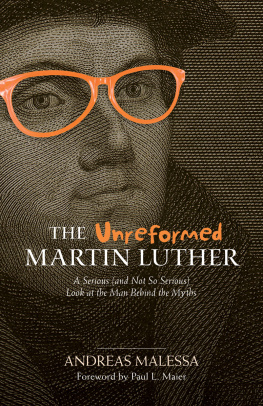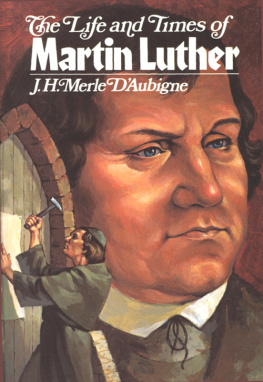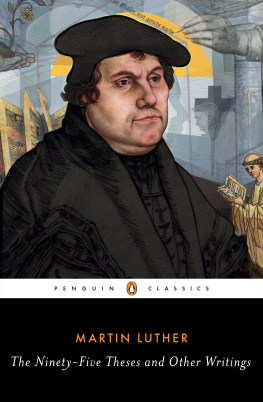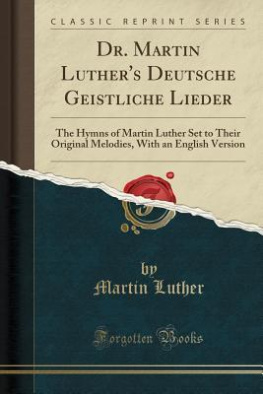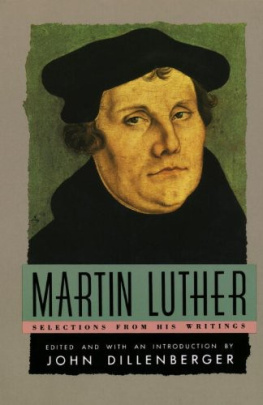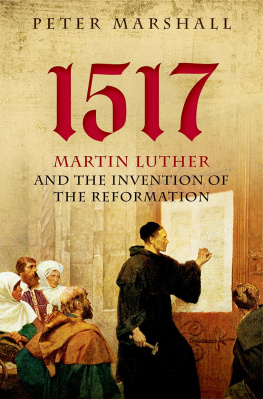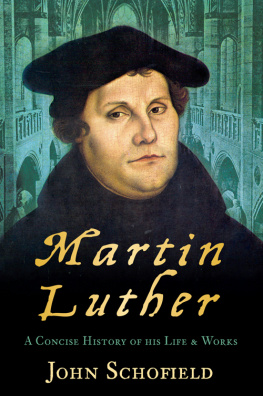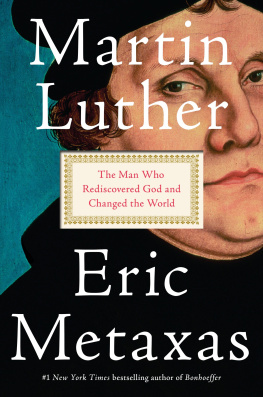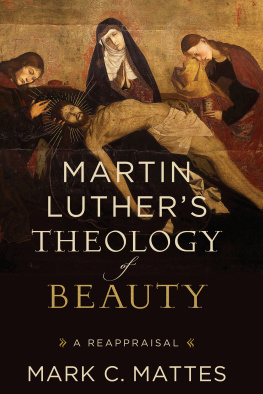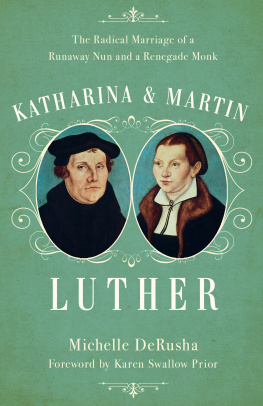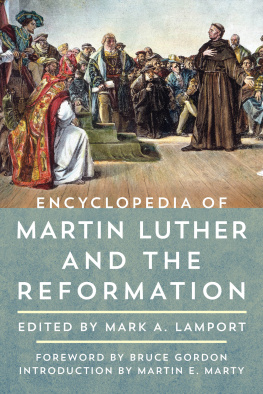

MARTIN LUTHER
AND THE DAY
THAT CHANGED THE WORLD
MARTIN E. MARTY
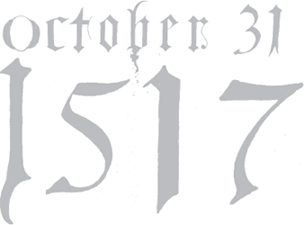
MARTIN LUTHER
AND THE DAY
THAT CHANGED THE WORLD
FOREWORD BY JAMES MARTIN, SJ

2016 First printing
October 31, 1517: Martin Luther and the Day that Changed the World
Copyright 2016 by Martin E. Marty
ISBN 978-1-61261-656-8
The Paraclete Press name and logo (dove on cross) are trademarks of Paraclete Press, Inc.
Library of Congress Cataloging-in-Publication Data
Names: Marty, Martin E., 1928- author.
Title: October 31, 1517 : Martin Luther and the day that changed the world / Martin E. Marty.
Description: Brewster MA : Paraclete Press Inc., 2016. | Includes bibliographical references.
Identifiers: LCCN 2015051036 | ISBN 9781612616568
Subjects: LCSH: Luther, Martin, 1483-1546. | Luther, Martin, 1483-1546. Disputatio pro declaratione virtutis indulgentiarum. | ReformationGermanySources.
Classification: LCC BR326.5 .M37 2016 | DDC 284.1092dc23
LC record available at http://lccn.loc.gov/2015051036
10 9 8 7 6 5 4 3 2 1
All rights reserved. No portion of this book may be reproduced, stored in an electronic retrieval system, or transmitted in any form or by any meanselectronic, mechanical, photocopy, recording, or any otherexcept for brief quotations in printed reviews, without the prior permission of the publisher.
Published by Paraclete Press
Brewster, Massachusetts
www.paracletepress.com
Printed in the United States of America
CONTENTS
FOREWORD
by James Martin, SJ
M Y FAVORITE GENRE OF WRITING IS A short book on a big topic written by an expert. This is that kind of book. Martin Marty, one of the worlds preeminent scholars of religion, has written a succinct meditation on Martin Luthers Ninety-Five Theses, brilliantly summing up its history, its influence, and its meaning for us today, and it is a gem. But what else would one expect from this peerless scholar and superb writer?
There is no little irony in a Jesuit writing a preface for this book (beyond the droll wordplay of James Martin on Martin Marty on Martin Luther). For the Jesuit Order, founded in 1540 and formally known as the Society of Jesus, is often, incorrectly, referred to as the Shock Troops of the Counter-Reformation.
Like so much else written about the heated period known as the Reformation (or the Lutheran Reformation), this is inaccurate. St. Ignatius Loyola did not found the Jesuit Order in response to the Reformation.
In fact, as the Jesuit historian John OMalley has pointed out in several books, for all the emphasis on the famous diptych of Luther on one side and Ignatius on the other, and for all the emphasis on the important role of the Jesuits in the Counter-Reformation (or the Catholic Reform), it is remarkable how infrequently the early Jesuits mention the Reformers in their letters and documents.
St. Ignatiuss Autobiography, for example, written in large part to provide his fellow Jesuits with a detailed description of the spiritual background of the Society of Jesus, completely ignores the Reformation. Likewise, the Jesuit Constitutions, the overarching document meant to govern the Society and explain the nascent religious order to the church, to the world, and to the Jesuits themselves, mentions Luther and Lutheranism not at all.
What accounts for this? Mainly that Ignatius had a different purpose for setting up the Jesuits. It was not to counter the Reformers. Nor was it to serve as a bulwark against Lutheranism (though even many Jesuits may have thought so). Rather, Ignatiuss original goal was simpler, and it was a goal that, ironically, closely unites him with Martin Luther. It was to help souls.
The term help souls appears again and again in Ignatiuss writings. And it is here that his life intersects rather poignantly with that of Martin Luther. For both men sought to help souls, though, as events transpired, in very different ways: one, though it was not his choice, by reforming the church from without; the other, though he would not have said it this way and certainly not publicly, by reforming the church from within.
Notably, both were appalled by the excesses of the Catholic Church at the time, though for different reasons. Now, it should be said that for Ignatius, who placed himself at the disposal of the pope and who once said that if the church said black was white he would have to agree, the Catholic Church was one of the centerpieces of his spirituality. Nonetheless, both he and Luther took dim views of church corruption. For Luther, the chief sin was the sale of indulgences, which were, in essence, time off from purgatory. Luthers horror of that malign practice is well known.
What is less known is what constituted an ecclesial horror for Ignatius. For him the chief sins of the church were clericalism, the attitude that views clerics as superior to all others, as well as careerism, which he saw as an absolute poison.
The founder of the Jesuits went so far as to require that all Jesuits making their Final Vows at the end of their long training period promise publicly that they would never strive for high offices, either in the Society of Jesus or in the larger church. Moreover, if they had evidence of another Jesuit ambitioning, they were to report him to the mans superiors. (That promise is still made by Jesuits today.) This was Ignatiuss unique way of combatting church corruption.
Luther and Ignatius, then, were closer than one might think. Lutheran and Catholic reformers, if you will. And in recent years, happily, the two denominations, Lutheranism and Catholicism, have grown ever closer.
The signal grace of this indispensable book is that Professor Marty continues this reconciliation and shows us not only how Martin Luthers insights still speak to us but also how the differences between Catholics and Protestants serve to enrich our church. These differences, in fact, only underline the various ways both groups have sought to serve the one Lord, Jesus Christ, by, in their own ways, striving to help souls.

MARTIN LUTHER
AND THE DAY
THAT CHANGED THE WORLD
CHAPTER
one

AN INVITATION
T HIS IS AN INVITATION TO A PARTY, one that commemorates events that began five hundred years ago in Europe and have consequences throughout the world today. Throughout these pages, we shall frequently compare two things, a heart and a soul. The story will deal with relations between the two, the first belonging to Martin Luther and those in his legacy, and the second to the Roman Catholic Church and those who belong to its community or communion.
Philosopher Eugen Rosenstock-Huessy observed that He had to know that many would disagree. After all, an encyclopedia or a catalog, for example, are full of many ideas. Nevertheless, an encyclopedia is ultimately indeed expressive of one idea, that of providing information, and the single idea of a catalog is to display.
Next page


